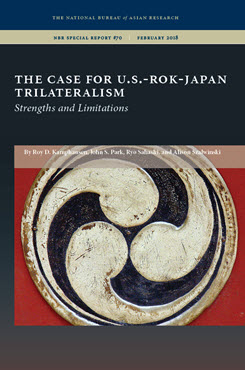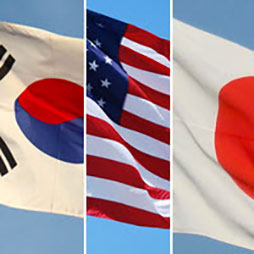NBR Special Report no. 70
The Case for U.S.-ROK-Japan Trilateralism
Strengths and Limitations
This report situates the U.S.-ROK-Japan relationship in the context of the scholarly literature on trilateralism and offers concrete recommendations for strengthening trilateral cooperation in four key areas: regional security, nontraditional security, energy security, and space and cybersecurity.
EXECUTIVE SUMMARY
MAIN ARGUMENT
Trilateral cooperation between the U.S., the ROK, and Japan is a necessary and effective approach to address many of the traditional and nontraditional challenges both within and outside Asia. Trilateral initiatives are most successful when they are based on countering shared threats and promoting concrete, common interests, rather than being carried out just for the sake of the three countries doing something together. Rooted in such shared interests and values, the U.S.-ROK-Japan relationship has made significantly more concrete, substantive progress than other trilaterals in recent decades. However, as security challenges in East Asia grow increasingly acute, a more concerted trilateral approach from the U.S., South Korea, and Japan is needed. In early 2016, the relationship appeared to be entering a golden period of cooperation, as progress on sensitive issues such as missile defense, information sharing, and historical disputes offered room for cautious optimism. But momentum has notably slowed over the last year. On the one hand, coordination between Japan and the ROK has not been smooth due to a lack of strategic trust. On the other hand, there are ongoing concerns about the U.S. commitment to the region. The three nations must work together to address the lingering tensions and concerns that inhibit greater trilateral cooperation and emphasize that such cooperation is necessary to protect each country’s citizens and preserve a rules-based order in Asia.
POLICY IMPLICATIONS
- The U.S., the ROK, and Japan should prioritize military coordination, especially trilateral military exercises, to strengthen security vis-à-vis North Korea.
- Cooperation on addressing nontraditional security challenges provides an opportunity to build strategic trust. In particular, the three countries should participate in combined HADR and peacekeeping activities, explore ways to improve regional energy security, and collaborate on addressing security threats in the cyber and space domains.
- U.S., ROK, and Japanese leaders should publicly emphasize the importance of trilateral security cooperation to gain popular approval within each nation and promote broader Asian regionalism and democratic values.



